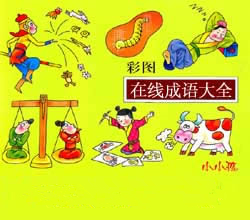搜成语提供成语解释、出处、成语谜语、成语故事大全、成语接龙、近义词、反义词等查询
英译
ZHOU Bangyan – Lyrics to the Melody of the West River (In remembrance of bygone eras at Jinling)In this prosperous region, who remembers the South's grand eras?Mountains and fields of the countryside and the winding YangtzeSurround and build up away from the city.Raging billows like loneliness towards a solitary castle heave,On the distant horizon navigate sails and masts of ships.Off the precipice rugged trees overhang still,Who still comes here to secure the boat of a gent who never worried?All that remains on a historic site is sentimentality.And fog has come to one half of a castle conceal.Deep in the night, over the parapet the moon shines,In grief I look towards the east where pass the waters of River Huai.What a flourishing city full of wine vendors' pennants and operatic drumming!Faint is the memory of the Wangs, the Xies and their neighbourhoods,Swallows have come and gone for generations that all have lost count of.There are now ordinary people along the same streets and alleyways,Telling tales of the rise and fall of former times in the setting sun.
推荐古诗:
前有樽酒行二首其一、渡湘江、送韩十四江东觐省、短歌行赠王郎司直、题菊花、竹里馆、天净沙·秋思(枯藤老树昏鸦)、春日词(春云阴阴雪欲落)、无题(惯于长夜过春时)、江城子(十年生死两茫茫)
推荐诗句:
谁料同心结不成,翻就相思结、当君怀归日,是妾断肠时、飞流直下三千尺,疑是银河落九天、人生如逆旅,我亦是行人、小楼昨夜又东风,故国不堪回首月明中、北风卷地白草折,胡天八月即飞雪、壮心未与年俱老,死去犹能作鬼雄、十年磨一剑,霜刃未曾试、令公桃李满天下,何用堂前更种花、日暮苍山远,天寒白屋贫
热文成语
- 哀感顽艳 原意是指内容凄切,文辞华丽,使愚笨和聪慧的人同样受感动。后多用来指艳情的小说、戏曲、电影中的感人情节。
- 匪夷所思 匪:不是;夷:平常。指言谈行动离奇古怪,不是一般人根据常情所能想象的。
- 风不鸣条 和风轻拂,树枝不发出声响。比喻社会安定。
- 匪夷匪惠 夷:殷末周初的伯夷;惠:春秋时鲁国的柳下惠。既不是伯夷,又不是柳下惠;不具备这两位贤人的品德。形容才德不高而又驾驭的人。
- 飞沙走砾 沙:沙土;砾:小石块。沙土飞扬,小石块滚动。形容风势很猛。
- 本同末异 本:本原。末:末流。比喻事物同一本原,而派生出来的末流则有所不同。
- 比上不足,比下有余 赶不上前面的,却超过了后面的。这是满足现状,不努力进取的人安慰自己的话。有时也用来劝人要知足。
- 飞黄腾达 飞黄:传说中神马名;腾达:上升,引伸为发迹,宦途得意。形容骏马奔腾飞驰。比喻骤然得志,官职升得很快。
- 兵戎相见 兵戎:武器。以武力相见。指用战争解决问题。
- 博览群书 博:广泛。广泛地阅读各种书。形容读书很多。
- 飞蛾投火 象蛾子扑火一样。比喻自找死路、自取灭亡。
- 不约而同 约:相约。事先没有约定而相互一致。
- 百喙一词 犹言众口一辞。同“百喙如一”。
- 泛萍浮梗 浮动在水面的萍草和树根。比喻踪迹漂泊不定。
- 败材伤锦 比喻用非其人,伤害国家。
